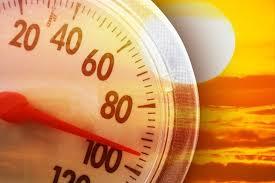 This week, cities and towns all over the United States have been hit by heat waves, with temperatures reaching the high 90s and low 100s. The National Weather Service reports that heat is one of the leading weather-related killers and results in hundreds of fatalities each year and even more cases of heat-related illnesses, including heat exhaustion and heat stroke.
This week, cities and towns all over the United States have been hit by heat waves, with temperatures reaching the high 90s and low 100s. The National Weather Service reports that heat is one of the leading weather-related killers and results in hundreds of fatalities each year and even more cases of heat-related illnesses, including heat exhaustion and heat stroke.
Spending too much time outside, over-working your body on a hot day, or staying too long in an overheated place can cause heat-related illnesses. In order to stay safe, it is important to know the signs and symptoms:
Heat exhaustion is the body’s response to excessive loss of water and salt that is contained in sweat. It usually occurs after being exposed to high temperatures in combination with not drinking enough water. The warning signs of heat exhaustion include heavy sweating, paleness, muscle cramps, weakness, and fainting. Victims will typically have a fast but weak pulse rate and fast but shallow breathing. Be sure to help the victim cool down by having them hydrate with cool water and move them to an air-conditioned environment. If left untreated, heat exhaustion can lead to heat stroke.
Heat stroke is the most serious heat illness and it is considered a medical emergency. It occurs when the body temperature rises rapidly due to exposure to high temperatures and dehydration, which leads to failure of the body’s temperature control system. The warning signs are: extremely high body temperature, usually 104 °F or above, red, hot, dry skin, no sweating, a rapid, strong pulse, dizziness, disorientation, and nausea. If you see someone with any of these signs, immediately call for medical assistance. It is also crucial that you begin to cool down the victim by placing them in a cool shower, spraying them down with cool water, wrapping them in a cool, wet towel. Do NOT give the victim fluids to drink.
Heat related deaths are 100% preventable. Here are some tips to staying safe during a heat wave:
- Drink plenty of water and avoid drinks with alcohol or caffeine
- Wear lightweight, loose fitting, light-colored clothing
- Stay indoors and avoid strenuous exercise during the hottest part of the day
- Never leave children, disabled adults, or pets in parked vehicles
- Minimize direct exposure to the sun and wear sunscreen
- Use air conditioners or spend time in air-conditioned places such as malls or libraries
- Listen to local weather forecasts and stay aware of upcoming temperature changes
Sources:
